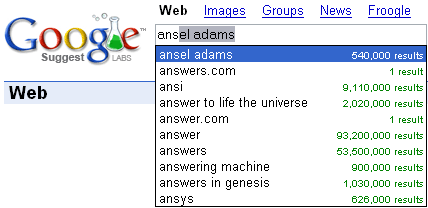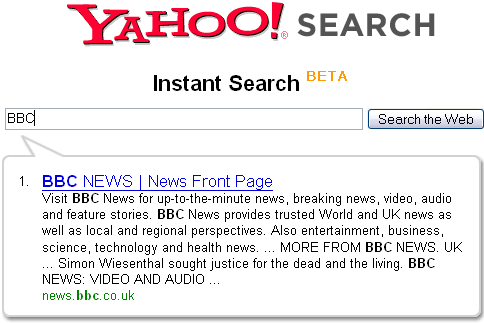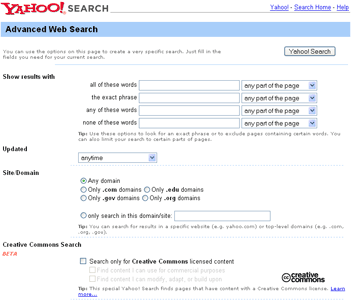Smarter searching: liberating information from the Internet
![]() Download a print version of this article
Download a print version of this article
This post is part of a series entitled "Smarter searching: liberating information from the Internet", based on my presentation at the 2006 AUKML Conference in Edinburgh
Introduction
Once upon a time, when the public were searching for information, they would have to carry themselves off to a public library and ask the nice librarian behind the desk to help them look. They'd pull out some typed index cards, and eventually the library user might find a book that might give them the answer they were looking for.

Then the internet came along, and with it the world wide web, and sites like Excite, AltaVista and Hotbot sprang up. They allowed Joe Public to type a few words into their computer at home, and generally during the late nineties, if my memory serves me correctly, they would then get a list of sites which featured pictures of Pamela Anderson.
And then Google arrived. It was a revelation. Firstly it processed your search query really, really fast - in fact the time taken to provide your results is still proudly part of their user interface.
Secondly, and the really revolutionary thing, there was a pretty good chance that in the first results you'd actually find what you were looking for.
And the rest, as they say, is history. Now everybody is able to find anything they want just by typing two words into Google, information professionals are no more, and everybody lived happily ever after...
...well, not quite.
The trouble is, as powerful as search engines on the web can be, most people still don't know how to use them very well. For example the average query string to pull out a precise document from a corpus comprising of billions of pages is still only a couple of words.
So there is still a real opportunity for information professionals to keep one step ahead of Joe and Josephine public, by staying up to date with some of the interesting developments in the world of search on the internet.
I hope to outline some new services from the major search engines, and some techniques for liberating information from the internet, which ought to make your daily lives searching for information much easier.
Making search faster
Of course we are all familiar with the main interfaces of Google, Yahoo!, Ask and MSN Search, and the main services they offer, but they have a host of service related to search which are worth investigating.
For example, both Google and Yahoo! offer trial services aimed at speeding up the search experience. Google Suggest offers a drop-down list of suggestions as you type, based on other people's search queries, and how many results are generated by the queries.

Yahoo! Instant Search displays the top result back to you for your query as you type. These are both pretty gimmicky, but illustrate that a lot of thinking is going on about ways of improving the efficiency of delivering results - and of course the adverts that go with them.

Using advanced search
It is certainly worth investing some time in learning the advanced features and syntax offered by the major search engines. Whilst these complicated forms can look intimidating at first, they provide a fine degree of control when you are using the internet to research.

On Google, for example, you can restrict your results to being of a particular document type. Restricting results to only PDF files that have been indexed is useful when looking for research papers. You can also restrict the results to come from only one site. Combine those filters, and looking for PDF documents from a specific corporate domain can mean that effectively you have already narrowed your search down to press releases by a particular company.
Tomorrow I'll be looking at how Google personalises your search results
Check out the movie Desk Set (1957) http://imdb.com/title/tt0050307/ -- about the role of information professionals changing from indexing & information retrieval librarians to computer operators with the introduction of technology.
Well I didn't understand what you wrote. I just wanted to know how to use the internet.